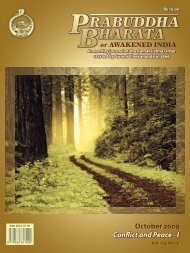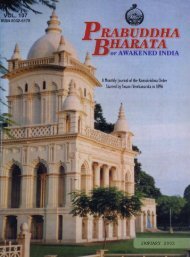According
August 2009 - Advaita Ashrama
August 2009 - Advaita Ashrama
- No tags were found...
Create successful ePaper yourself
Turn your PDF publications into a flip-book with our unique Google optimized e-Paper software.
guage. Physical pleasures such as eating and drinking<br />
drag a person down. If his faculties are tuned in<br />
the opposite direction, he sees the truth as intensely<br />
as he sees the phenomenal world! Swamiji says repeatedly:<br />
‘Get up and manifest the divinity that is<br />
already in you’, give up this making and breaking of<br />
mud pies. You are perfect already; learn to manifest<br />
it. Again: ‘Immortal man, dreaming mortal<br />
dreams!’ The difference between Plato and Indian<br />
thought seems to be that the latter considers mukti,<br />
liberation, the birthright of every human being; for<br />
Plato, very few achieve it.<br />
Those who have achieved the ‘good’ in Plato’s<br />
republic would not be allowed to stay in the ‘upper<br />
world’. They would be forced to become guardians<br />
or ministers of state for the welfare of the general<br />
public. They may view this as unjust and repugnant,<br />
but the aim of the state is the greater good, the welfare<br />
of the state as a whole, and the guardians must<br />
sacrifice themselves to serve it. Here Plato gives the<br />
meaning of the word ‘republic’ as res plus publica,<br />
the welfare of the state. He feels that young people<br />
who show the right character and qualities must go<br />
through rigorous training to become future guardians.<br />
He goes on to mention that the state ought to<br />
nurture and educate them to be kings of the hive, to<br />
rule in virtue and wisdom, not for wealth. Since the<br />
guardians have no taste for governance, they would<br />
be the wisest rulers. Thus, the state as a whole prospers<br />
and its citizens achieve the best they are capable<br />
of: ‘The release of the prisoners from chains, and<br />
their translation from the shadows to the images<br />
and to the light, and the ascent from the underground<br />
den to the sun … this power of elevating the<br />
highest principle in the soul to the contemplation<br />
of that which is best in existence, with which we<br />
may compare the raising of that faculty which is the<br />
very light of the body to the sight of that which is<br />
brightest in the material and visible world ’ (194).<br />
The dialectic proceeds through ‘study and pursuit<br />
of the arts’ so that we perceive not just an image<br />
but the absolute Truth. It leads to knowledge of<br />
true existence and the true nature of each material<br />
thing. ‘The eye of the soul, which is literally buried<br />
PB August 2009<br />
Plato’s Allegory of the Cave: A Vedantic Reading 37<br />
in an outlandish slough, is … lifted upwards’ (195).<br />
The reference to the eye of the soul is in some ways<br />
reminiscent of Shiva’s third eye, though of course<br />
that has a much deeper and broader connotation.<br />
The discourse finally attains a ‘conception of the<br />
essence of each thing’. This whole exercise of drawing<br />
up a blueprint for the ideal state and for the<br />
nurturing and training of philosopher kings is not<br />
a ‘dream’: ‘When the true philosopher kings are<br />
born in a State, one or more of them, despising the<br />
honours of this present world which they deem<br />
mean and worthless, esteeming above all things<br />
right and the honour that springs from right, and<br />
regarding justice as the greatest and most necessary<br />
of all things, whose ministers they are, and whose<br />
principles will be exalted by them when they set in<br />
order their own city’ (202).<br />
There are too many echoes, too many similarities<br />
and parallels between Plato’s allegory of the<br />
cave and Indian thought. I have quoted extensively<br />
from Swami Vivekananda. Apart from the depth<br />
and sweep of his insight, the point of course is that<br />
he relied extensively on the Upanishads and other<br />
scriptures, which definitely pre-date Plato. And<br />
the voice of the Upanishads reverberate eternally:<br />
‘I shall tell you in half a couplet that which has<br />
been stated in millions of Vedanta books: Brahman<br />
alone is real, and the world illusory; man is<br />
none other than Brahman.’ 7<br />
P<br />
References<br />
1. Bertrand Russell, Unpopular Essays (London: Taylor<br />
& Francis, 2009), 7.<br />
2. Plato, The Republic, trans. Benjamin Jowett (New<br />
York: Dover, 2000), 177–8.<br />
3. Bertrand Russell, A History of Western Philosophy<br />
(London: Allen & Unwin, 1946), 143.<br />
4. The Complete Works of Swami Vivekananda, 9 vols<br />
(Calcutta: Advaita Ashrama, 1–8, 1989; 9, 1997),<br />
2.119.<br />
5. Her Devotee-Children, The Gospel of The Holy<br />
Mother Sri Sarada Devi (Chennai: Ramakrishna<br />
Math, 2002), 185.<br />
6. The Republic, 180–1.<br />
7. Ātmabodhaḥ: Self-knowledge, trans. Swami Nikhilananda<br />
(Madras: Ramakrishna Math, 1967) 222.<br />
477
















